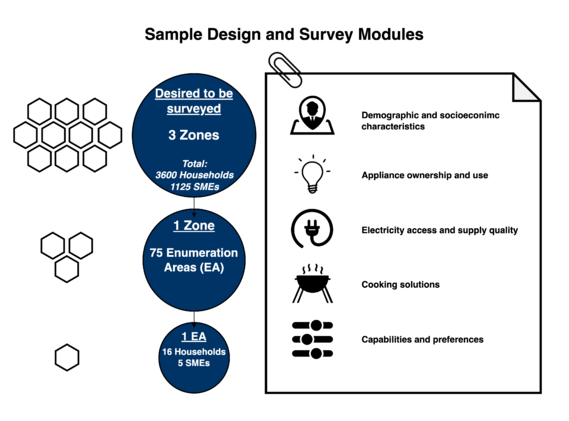Difference between revisions of "PeopleSuN Survey Data"
***** (***** | *****) |
***** (***** | *****) m Tag: 2017 source edit |
||
| (12 intermediate revisions by 3 users not shown) | |||
| Line 1: | Line 1: | ||
| − | <div class="portal-mozambique"> <!-- Defines the color of headlines, link, etc. ) --> | + | <div class="portal-mozambique">{{Backlink Dimension User Needs}}<!-- Defines the color of headlines, link, etc. ) --> |
| − | {{Backlink Dimension Demand}} | + | {{Backlink Dimension Demand}} |
| − | + | As part of the PeopleSuN project funded by the German Federal Ministry of Education and Research (BMBF) within the funding initiative ‘Client II - International Partnerships for Sustainable Innovations’, an extensive dataset was collected through household and enterprise energy surveys conducted in Nigeria in 2021. The surveys covered 225 enumeration areas in three Nigerian geopolitical zones, North West, North Central and South-South. The dataset includes a total of 3,599 households and 1,122 small and medium-sized enterprises. The sample was designed to be representative of rural and peri-urban grid-electrified regions in each zone. The dataset is publicly available on [https://dataverse.harvard.edu/dataset.xhtml?persistentId=doi:10.7910/DVN/GTNEJD PeopleSuN Harvard dataverse] for the open access of academic community, local stakeholders and international initiatives. | |
| − | [[File: | + | The surveys aimed to gather comprehensive data on various aspects, including demographic and socioeconomic characteristics, energy access, supply quality, ownership, and usage patterns of electrical appliances, cooking solutions, energy-related capabilities, and supply preferences [see figure 1].[[File:PeopleSuN_sample_design.png|alt=|none|thumb|569x569px|Figure 1: PeopleSuN survey data sample design overview. Reproduced from Pelz et al 2023.]]More information on the survey design and data collection can be found in Pelz et al 2023<ref name=":0">Pelz, S., Chinichian, N., Neyrand, C., & Blechinger, P. (2023). Electricity supply quality and use among rural and peri-urban households and small firms in Nigeria. Scientific Data, 10(1), 273. <nowiki>https://doi.org/10.1038/s41597-023-02185-0</nowiki><blockquote></blockquote></ref>. |
| − | |||
| − | |||
| − | |||
| − | |||
| − | |||
| − | |||
| − | |||
| − | |||
| − | |||
| − | |||
| − | |||
| − | |||
| − | |||
| − | |||
| − | |||
| − | |||
| − | |||
| − | |||
| − | |||
| − | |||
</div> | </div> | ||
[[Category:Nigeria Off-Grid Solar Knowledge Hub]] | [[Category:Nigeria Off-Grid Solar Knowledge Hub]] | ||
Latest revision as of 08:49, 13 September 2023
As part of the PeopleSuN project funded by the German Federal Ministry of Education and Research (BMBF) within the funding initiative ‘Client II - International Partnerships for Sustainable Innovations’, an extensive dataset was collected through household and enterprise energy surveys conducted in Nigeria in 2021. The surveys covered 225 enumeration areas in three Nigerian geopolitical zones, North West, North Central and South-South. The dataset includes a total of 3,599 households and 1,122 small and medium-sized enterprises. The sample was designed to be representative of rural and peri-urban grid-electrified regions in each zone. The dataset is publicly available on PeopleSuN Harvard dataverse for the open access of academic community, local stakeholders and international initiatives.
- ↑ Pelz, S., Chinichian, N., Neyrand, C., & Blechinger, P. (2023). Electricity supply quality and use among rural and peri-urban households and small firms in Nigeria. Scientific Data, 10(1), 273. https://doi.org/10.1038/s41597-023-02185-0




















